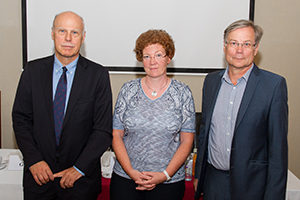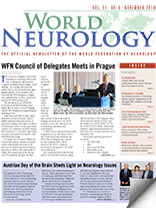By Wolfgang Grisold, MD

Wolfgang Grisold, MD, (from left) WFN secretary general, Elisabeth Fertl, MD, OEGN president, and Reinhold Schmidt, MD, OEGN past president, represent the OEGN during the World Brain Day 2016 press conference.
The Austrian Society of Neurology (OEGN) participated in the third Day of the Brain July 22, 2016, by discussing important topics at a press conference. The OEGN was represented by Elisabeth Fertl, MD, OEGN president, Reinhold Schmidt, MD, OEGN past president, and Wolfgang Grisold, MD, World Federation of Neurology (WFN) secretary general.
In Europe, 220 million people suffer from one or several neurological diseases. This is important because with increasing age, individuals experience disorders such as dementia, Parkinson’s disease, and stroke more frequently.
Austrian neurology, represented by the OEGN, has a strong presence with 970 neurologists, including previous neuropsychiatrists. Within Austria, there is a network of 38 acute departments with stroke units, a growing number of neurological rehabilitation centers, and other neurological centers devoted to care and rehabilitation. All stroke units are connected in a nationwide data and quality assurance system, and they have incorporated intravenous thrombolysis in their procedures. In 11 stroke units, interventional procedures can be performed for patients with acute stroke.
Dr. Schmidt gave an overview on dementia, emphasizing that efforts are needed to maintain cognitive abilities with age and in aged persons. In particular, in 75- and 80-year-old individuals, more risk for cognitive changes can be expected. The aim and strategy must be to identify the factors that positively enhance cognitive reserve. Increasingly, activity training of cognitive abilities and maintenance of social networks have been identified as positive factors.
Age is often identified as a burden (e.g., related to the burden of disease)and a contributor to increasing health care costs. This is, however, a naturally occurring phase in the life cycle with increasing needs. It is the duty of neurologists to act as advocates for our patients, to see the importance of these neurological needs for our patients, and to avoid classifying age as a burden.
Another important task in neurology is palliative care. Several neurological diseases need palliative settings of different types and time courses. For example, palliative care can be a long-term project in patients with degenerative diseases or a shorter time course in amyotrophic lateral sclerosis and brain tumors. Palliative care is not the same as end-of-life care, and it is important to include these concepts into neurology worldwide.
Worldwide, the WFN is engaged in intensive cooperation with the World Health Organization, including with ICD 11, noncommunicable diseases, and the present state of the Zika infection, where the WFN has created an international expert group.
The Austrian society had a strong echo in the media after the press conference, including several follow-up radio interviews.
